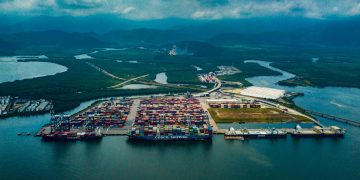Shipping companies including the German shipping giant Hapag-Lloyd and a number of NGOs have called on the UN global shipping agency to exclude unsustainable biofuels from its list of green alternatives to traditional fossil fuels, the Transport & Environment (T&E) informed.
In that regard, Transport & Environment reminds that in 2023, the IMO agreed to a new climate strategy that includes reaching net-zero greenhouse gas emissions “by or around, i.e., close to, 2050.” In the meantime the IMO has set the target of cutting emissions by 20%-30% by 2030 and 70%-80% by 2040, against 2008 levels. A key part of this is the Global Fuel Standard which would force ships to reduce their GHG emissions by switching to alternative – and cleaner – fuels.
National delegates will be in London, 17 – 21 February, for the 18th meeting of the Intersessional Working Group on Reduction of GHG Emissions from Ships (ISWG-GHG 18) to debate new regulatory measures for decarbonising the shipping industry.
”Without key safeguards, the new measures could lead to palm and soy oil to skyrocket as they will become the cheapest fuel to comply with lower emission standards, while waste biofuels such as used cooking oil are limited in availability.” Transport & Environment highlighted in a press announcement.
Constance Dijkstra, shipping manager at T&E, said: “As things stand the IMO risks doing more harm than good. Palm and soy biofuels are devastating for the climate and they take up vast amounts of land. Instead of creating new problems, the global shipping community must focus on green fuels made from hydrogen. Burning crops is never the answer.”
As stated in the letter, unless legally-binding safeguards are introduced, there is a risk that a large amount of fossil fuels will be replaced with unsustainable biofuels.
In line with the recommendations from the UN Environment Programme, the singatories call on the IMO and the Member States to discourage the use of crop-based biofuels by ships and to consider the following recommendations:
- Exclude crop-based biofuels from the eligibility list for compliance with existing and future MARPOL ANNEX VI regulations. This can be operationalized by, for example, assigning them well-to-wake GHG values of the least favorable fossil fuel pathways.
- Ensure that crop-based biofuels do not benefit from economic incentives directed towards promoting zero and near-zero emission fuels as part of the technical and economic measures that IMO is currently developing.
- The IMO should take note of the biofuels policy experiences and avoid similar mistakes to ensure a sustainable future for international shipping. Otherwise, we risk deploying a cure worse than the disease to address shipping’s climate impact.
In addition, the Global Forest Coalition and Biofuelwatch are among 69 environmental NGOs that have sent an open letter to the IMO Secretariat, opposing the inclusion of biofuels in the proposed greenhouse gas (GHG) fuel standard. The letter also criticized the Brazilian government, which is set to host COP30 in Belém this November, for being a key IMO member promoting biofuels in shipping to support its expanding biofuel market.
It is worth noticing that while these NGOs oppose biofuels derived from crops, most biofuel bunkers used in shipping today come from sustainable waste-based feedstocks, such as used cooking oil, which meet strict ISCC sustainability standards. As Bill Stamatopoulos, VeriFuel has explained ”Suppliers must be accredited by a reputable organization such as the International Sustainability Carbon Certification (ICSS), which establishes numerous conditions such as land, soil, and air preservation. It also considers zero deforestation, traceability across the supply chain, and ethics.”
Several shipping companies have invested in sustainable biofuels, voluntarily incorporating them into their fuel mix and committing to specific biofuel volumes.
































































